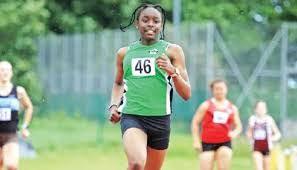Annabelle Fasuba, a remarkable 13-year-old athlete, is making headlines with her record-breaking performances and ambitious goal of competing in the Olympics. Recognised for her exceptional speed and determination, Fasuba is rapidly emerging as one of the most promising young talents in track and field. This article explores her journey, training regimen, and the challenges she faces as she pursues her dream of representing her country on the world’s biggest sporting stage.
Annabelle Fasuba’s Record-Breaking Journey in Athletics
At just 13 years old, Annabelle Fasuba has shattered multiple national junior records, putting herself on the fast track toward Olympic dreams. Her meteoric rise in athletics began with remarkable performances in sprint events, where her explosive speed and relentless dedication have set her apart from competitors twice her age. Coaches and analysts alike have been left astounded by her ability to maintain top form under pressure, signaling potential that could transform the landscape of youth athletics in the UK.
Her record-breaking times have rewritten the books in a variety of sprint distances, showcasing versatility and raw talent. The following table summarizes some of her most notable achievements in the past year:
| Event | Record Time | Date Set | Previous Record |
|---|---|---|---|
| 100 meters | 11.45 seconds | March 2024 | 11.68 seconds (2018) |
| 200 meters | 23.60 seconds | May 2024 | 23.88 seconds (2017) |
| 4x100m Relay (team) | 44.12 seconds | June 2024 | 44.48 seconds (2019) |
Beyond her undeniable speed, Annabelle’s commitment to training and mental resilience contributes significantly to her record-breaking streak. Her regimen includes:
- Daily sprint drills focusing on acceleration and technique
- Strength and conditioning sessions to enhance power
- Sports psychology coaching to build competitive focus
- Strict nutrition plan tailored for optimal performance
Challenges and Opportunities for Young Olympians Today
Young Olympians like Annabelle Fasuba face a unique blend of pressures and prospects as they navigate the path to elite competition. Balancing rigorous training schedules with education and social development is a constant challenge, often requiring support systems that extend beyond the sporting realm. Additionally, the heightened media attention on prodigious talents can weight heavily on their mental well-being, forcing many to adopt resilience strategies early in life. However, advancements in sports science and access to specialized coaching have significantly improved these athletes’ preparation and injury prevention techniques, turning many obstacles into stepping stones.
Opportunities for burgeoning Olympians have expanded alongside the global shift towards inclusivity and technology-driven performance analysis. Emerging platforms not only offer exposure to international competition but also foster peer networks that previously were inaccessible. Below is a snapshot of key factors shaping the landscape for young athletes today:
- Enhanced Training Programs: Tailored regimens focus on holistic development.
- Psychological Support: Early intervention improves mental health and focus.
- Digital Exposure: Social media and streaming elevate athlete profiles globally.
- Funding Challenges: Securing sponsorship remains competitive despite talent.
| Aspect | Challenge | Opportunity |
|---|---|---|
| Training | Overtraining risk | Smart recovery protocols |
| Media | Public scrutiny | Global fan engagement |
| Education | Time constraints | Online learning flexibility |
| Funding | Limited sponsorship | Crowdfunding and endorsements |
How Coaches and Communities Can Support Emerging Sports Talent
Emerging talents like Annabelle Fasuba thrive when coaches go beyond traditional training. Personalized mentorship helps young athletes build resilience and confidence while safeguarding their physical and mental well-being. Experienced coaches tailor programs that balance skill development with academic commitments, ensuring holistic growth. They also focus on cultivating a strong mindset by setting realistic goals and celebrating incremental progress, which is crucial for long-term success at elite levels.
Communities play a pivotal role by creating a supportive environment that fosters encouragement and inclusivity. Key community-driven strategies include:
- Providing accessible training facilities and resources
- Organizing local competitions to build competitive experience
- Offering scholarships and sponsorships for promising athletes
- Promoting awareness about sports pathways through schools and clubs
| Support Element | Impact on Emerging Talent |
|---|---|
| Mentorship | Builds confidence and strategic thinking |
| Community Events | Enhances competitive readiness |
| Funding Opportunities | Reduces financial barriers |
| Inclusive Culture | Encourages participation from diverse backgrounds |
In Retrospect
As Annabelle Fasuba continues to shatter records and defy expectations at just 13 years old, her sights remain firmly set on the Olympic stage. Balancing rigorous training with the challenges of adolescence, Fasuba embodies the next generation of British athletics talent. While the journey ahead is demanding, her early achievements and unwavering determination mark her as a name to watch in the years leading to Tokyo and beyond. The world will be watching as this young sprinter strives to turn her Olympic dreams into reality.





